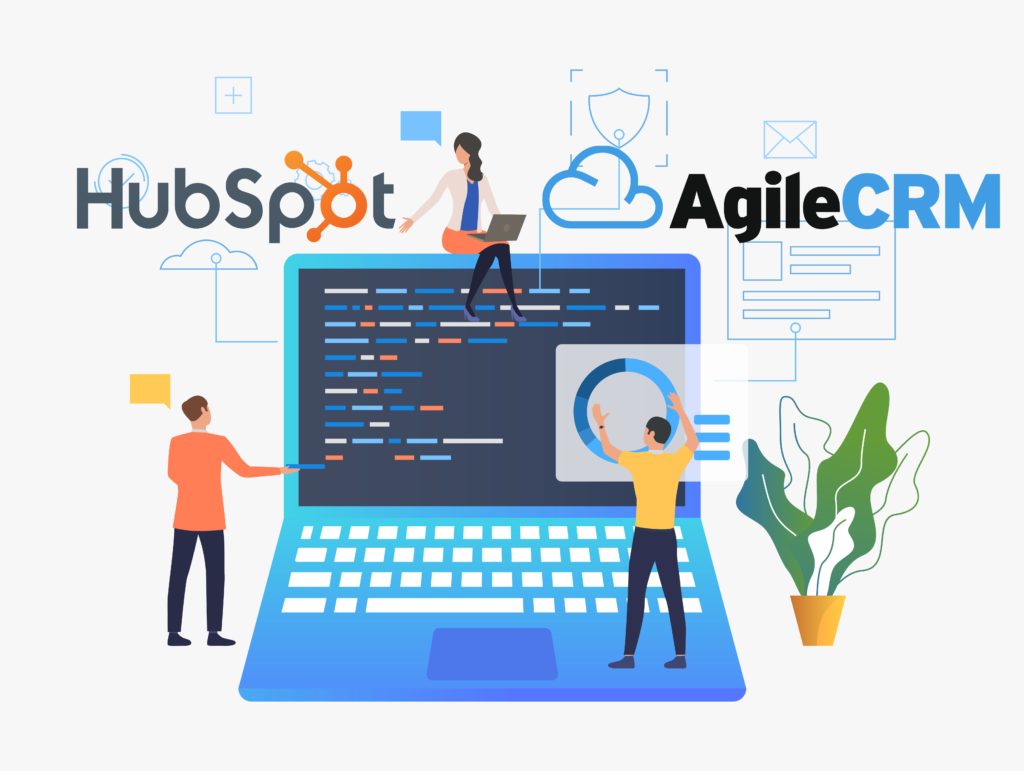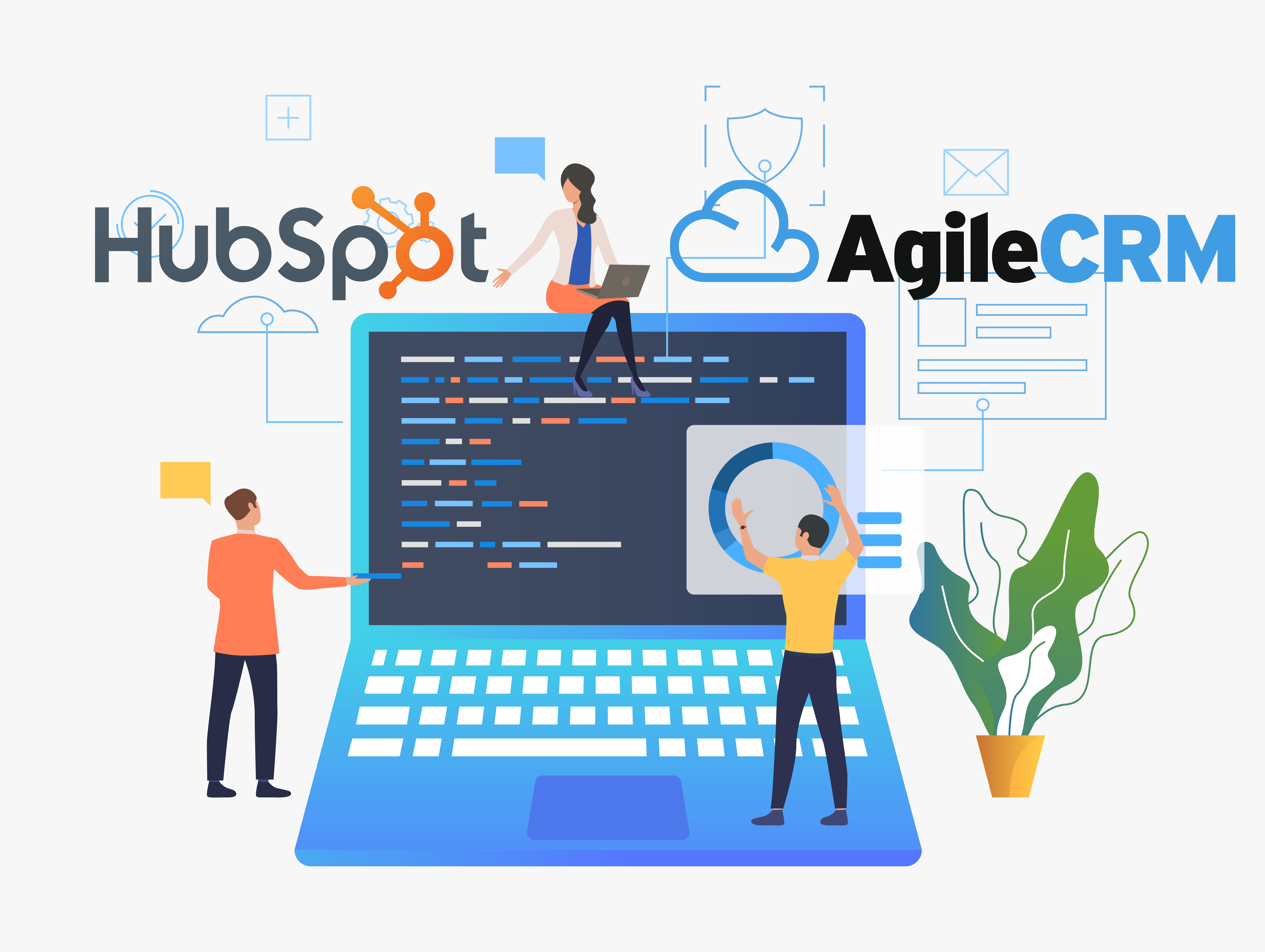When it comes to choosing the right CRM for your business, it can be overwhelming to decide between the many options available. Two of the most popular options on the market are HubSpot and Agile CRM. While both platforms offer a range of features to help businesses manage their customer relationships, they differ in several ways. In this article, we’ll take a closer look at Hubspot vs Agile CRM and help you determine which one might be the best fit for your business.

HubSpot vs Agile CRM: Features and Functionality
When it comes to features and functionality, both HubSpot and Agile CRM offer a wide range of tools to help businesses manage their customer relationships. However, there are some key differences between the two platforms.
HubSpot offers a suite of tools that includes marketing automation, sales, and customer service features. The platform also includes a content management system (CMS) that allows businesses to create and manage their websites, as well as an email marketing tool that lets them create and send email campaigns.
On the other hand, Agile CRM offers a similar suite of tools, including sales, marketing, and customer service features. However, Agile CRM also includes project management and telephony tools, which can be useful for businesses that need to manage multiple projects or communicate with customers over the phone.
HubSpot vs Agile CRM: Pricing
Another important consideration when comparing HubSpot vs Agile CRM is pricing. Both platforms offer a range of pricing options to suit businesses of different sizes and needs.
HubSpot offers a free CRM that includes basic features such as contact management and email tracking. However, businesses that want access to more advanced features, such as marketing automation and sales tools, will need to upgrade to one of HubSpot’s paid plans. Pricing for these plans starts at $50 per month for the Starter plan and goes up to $3,200 per month for the Enterprise plan.
Agile CRM also offers a free plan that includes basic features such as contact management and email tracking. However, businesses that want access to more advanced features, such as marketing automation and telephony tools, will need to upgrade to one of Agile CRM’s paid plans. Pricing for these plans starts at $8.99 per user per month for the Starter plan and goes up to $47.99 per user per month for the Enterprise plan.
HubSpot vs Agile CRM: Ease of Use
When it comes to ease of use, both HubSpot and Agile CRM are relatively user-friendly. However, there are some differences between the two platforms that may make one more suitable for your business than the other.
HubSpot’s platform is designed to be intuitive and easy to use, with a clean and simple interface that makes it easy to navigate. The platform also includes a range of resources, such as tutorials and webinars, to help businesses get the most out of the platform.
Agile CRM’s platform is also relatively user-friendly, with a clean and modern interface that is easy to navigate. However, some users may find that the platform is not as intuitive as HubSpot’s, particularly when it comes to more complex features such as project management and telephony.
HubSpot vs Agile CRM: Customer Support
Another important consideration when comparing HubSpot vs Agile CRM is customer support. Both platforms offer a range of support options to help businesses get the most out of their CRM.
HubSpot offers a range of support options, including email support, phone support, and live chat support. The platform also includes a knowledge base and community forum, where users can find answers to common questions and connect with other users.
Agile CRM also offers a range of support options, including email support, phone support, and live chat support. The platform also includes a knowledge base and community forum, where users can find answers to common questions and connect with other users.
HubSpot vs Agile CRM:
Integrations
Integrations are an important consideration when choosing a CRM platform, as they can help businesses streamline their workflows and connect their CRM to other tools and platforms.
HubSpot offers a range of integrations with popular tools and platforms, including Salesforce, Zapier, and Shopify. The platform also includes an open API, which allows businesses to build custom integrations with other tools and platforms.
Agile CRM also offers a range of integrations with popular tools and platforms, including Zapier, Quickbooks, and Slack. The platform also includes an open API, which allows businesses to build custom integrations with other tools and platforms.
HubSpot vs Agile CRM: Pros and Cons
To summarize, here are some of the pros and cons of using HubSpot vs Agile CRM:
HubSpot Pros:
Wide range of features, including marketing automation and customer service tools
Intuitive and user-friendly interface
Strong customer support
Wide range of integrations
HubSpot Cons:
Can be expensive, especially for businesses that need access to more advanced features
Some users may find the platform overwhelming, especially if they are new to CRM software
Agile CRM Pros:
Wide range of features, including project management and telephony tools
Affordable pricing
Modern and clean interface
Strong customer support
Agile CRM Cons:
Some users may find the platform less intuitive than HubSpot’s
Limited integrations compared to HubSpot
HubSpot vs Agile CRM: Which One is Right for Your Business?
Ultimately, the best CRM platform for your business will depend on your specific needs and budget. If you’re looking for a platform that offers a wide range of features, including marketing automation and customer service tools, and don’t mind paying a higher price, HubSpot may be the best fit for your business. On the other hand, if you’re looking for a more affordable option that includes project management and telephony tools, Agile CRM may be a better choice.
Regardless of which platform you choose, it’s important to take the time to explore the different features and functionality available, and to consider factors such as ease of use, customer support, and integrations. By doing so, you can ensure that you choose a CRM platform that meets your business’s specific needs and helps you build stronger relationships with your customers.
Other Alternative
Simply CRM is a cloud-based customer relationship management (CRM) software that is designed to help businesses manage their customer relationships and sales processes. It offers a range of features and tools that can help businesses streamline their sales processes, track customer interactions, and improve customer engagement.
One of the key features of Simply CRM is its contact management tools. The software allows businesses to store all of their customer information in one central location, making it easy to access and update customer records as needed. Businesses can also segment their customer database based on various criteria, such as demographics, purchase history, and engagement level, allowing them to target specific groups with personalized marketing campaigns.
Simply CRM also offers sales pipeline management tools that allow businesses to track their sales processes from start to finish. The software provides a visual pipeline view of all open deals, allowing businesses to see where each deal is in the sales process and identify potential bottlenecks. This can help businesses prioritize their sales activities and focus on deals that are most likely to close.
In addition to its sales pipeline management tools, Simply CRM also offers marketing automation tools that can help businesses streamline their marketing processes. The software allows businesses to create and send email campaigns, track website visitors, and monitor social media engagement, all from within the platform. This can help businesses improve their customer engagement and drive more leads and sales.
Simply CRM also offers a range of other features, including task management tools, team collaboration tools, and reporting and analytics tools. The software is designed to be easy to use, with a simple and intuitive user interface that requires no technical expertise. It also offers a range of integrations with other popular business tools, such as Zapier, Mailchimp, and QuickBooks.
Overall, Simply CRM is a powerful and versatile CRM software that can help businesses of all sizes manage their customer relationships and sales processes more effectively. Its range of features and intuitive user interface make it a popular choice for businesses looking to improve their customer engagement and drive more sales.




